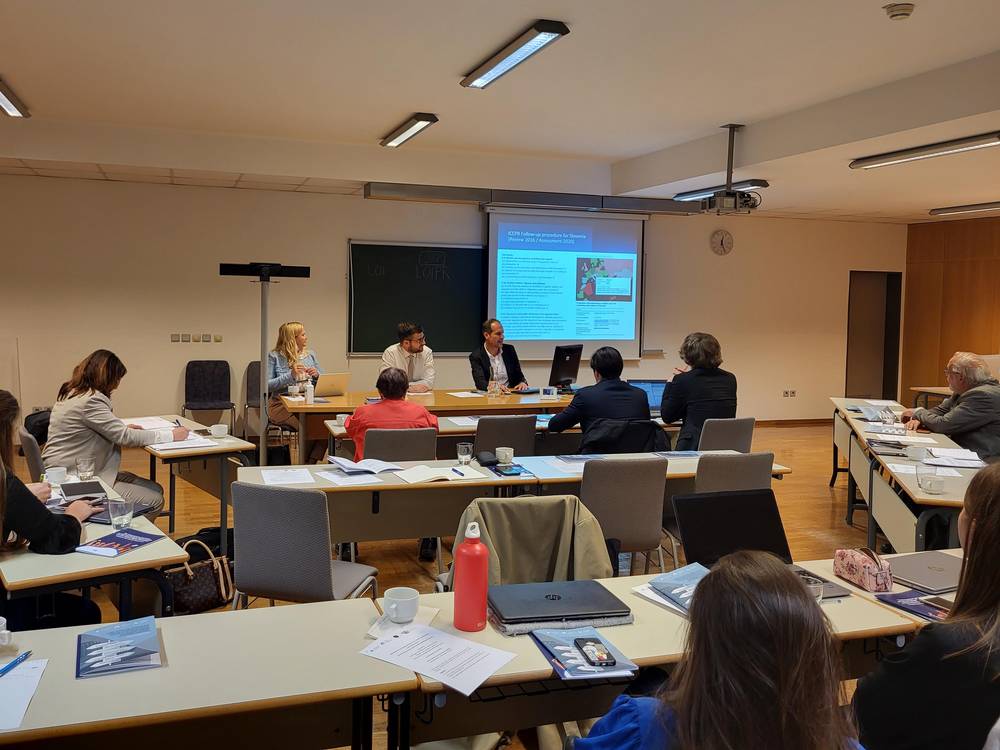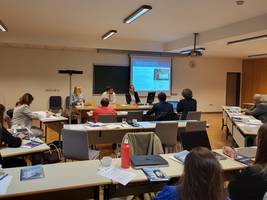On 10 May 2023, in cooperation with the Faculty of Law of the University of Ljubljana and the Centre for Civil and Political Rights (CCPR-Centre) from Geneva, the Human Rights Ombudsman organised a workshop on the participation of civil society organisations in the execution of states’ obligations based on international treaties of the United Nations about human rights. The purpose of the workshop was to raise the knowledge and understanding of procedures of implementation overview of international standards of human rights in international contracting bodies operating within the United Nations.
Slovenia is a contracting party in eight fundamental United Nations conventions about human rights. Along with every convention a special committee was also founded that monitors its implementation. The contracting states have a duty to report to these committees regularly about the implementation of conventions. The so-called alternative reports which can be prepared by national institutions for human rights or non-governmental organisations are becoming increasingly established. In recent years, the Ombudsman has contributed alternative reports several times, in which the institution warns about the failure to comply with the provisions of the conventions pertaining to the rights of women, children, people with disabilities, and different minorities. With this workshop the Institution of the Ombudsman wants to encourage non-governmental organisations to actively contribute and participate with their findings in warning against the deficient implementation of international human rights standards in Slovenia. The Ombudsman has already started to develop a Matrix of the implementation of the recommendations of international treaty committees for human rights, which will include an overview of all recommendations given to Slovenia in one place as well as an assessment of their implementation status.
“Human rights are universal and we cannot accept the logic that every state or authority can interpret them in its own way. International human rights law stipulates the obligations countries must respect. When a country becomes a contracting party of a certain international treaty, it assumes obligations and duties from this treaty,” said Deputy Ombudsman Miha Horvat.
For the effective protection of human rights, it is of the utmost importance to know the various complaint channels and methods. Slovenia has accepted the jurisdiction of the seven international treaty committees of the United Nations regarding individual complaints by individuals, namely for the Human Rights Committee, Committee against Torture, Committee on the Elimination of Racial Discrimination, Committee on the Elimination of Discrimination against Women, Committee on the Rights of the Child, Committee on the Rights of Persons with Disabilities, and the Committee on Enforced Disappearances. The Human Rights Ombudsman regrets that Slovenia still does not enable appeals of individuals to the Committee on Economic, Social and Cultural Rights. For five years, the Ombudsman has been calling on various governments, the Ministry of Labour, Family, Social Affairs and Equal Opportunities, and the National Assembly but has had no success.
Assistant Head of the Centre for Human Rights, Dr Simona Drenik Bavdek, emphasised at the workshop that appeal procedures do not only ensure protection for victims after violations have been committed but also serve as a key tool for the prevention of human rights violations. Namely, contracting bodies can directly contribute to the institutional and contextual changes with their decisions in individual cases that can in the long term influence not only individual victims but also the population as a whole.
At the workshop, the Ombudsman’s short guide: How and when to complain to the international treaty committees about human rights violations was presented. With the Guide, the Ombudsman wants to increase awareness of international human rights complaints procedures and to encourage their use in cases of alleged human rights violations under international human rights conventions, which are giving individuals the option to lodge complaints against the conduct of the state.
The workshop was led by Prof Vasilka Sancin from the Faculty of Law of the University of Ljubljana and the former vice-president of the UN Human Rights Committee, while its main speaker was Patrick Mutzenberg, the director of the Centre for Civil and Political Rights from Geneva. Their experience of participation in the work of international bodies on the side of the institution of the Ombudsman was presented by the Deputy Ombudsman and the Head of the Centre for Human Rights Miha Horvat, Assistant Head of the Centre for Human Rights Dr Simona Drenik Bavdek, and Jerneja Turin and Miha Nabergoj from the Centre for Human Rights.
The workshop was attended by representatives of various non-governmental organisations.

